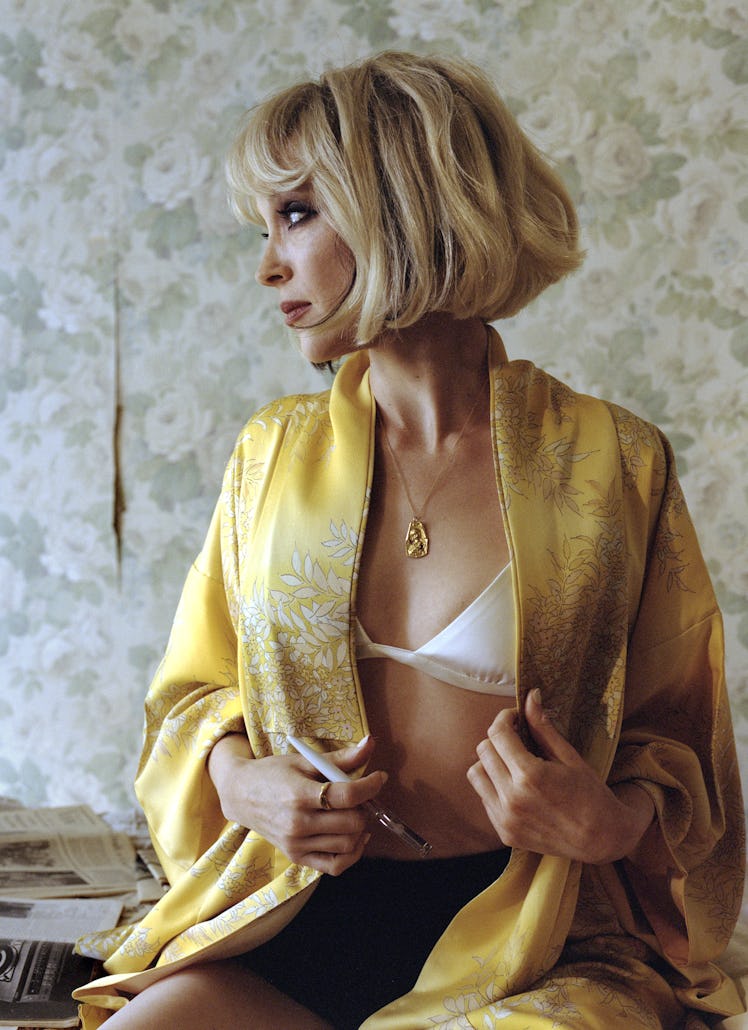St. Vincent’s recent performance on Saturday Night Live was the first time she’s been onstage since the world shut down last spring. Before that, the musician born Annie Clark had been spending time with family between California and Texas while finishing her latest album, Daddy’s Home, which was released earlier this month. Here, in an interview for W’s annual music issue, she opens up about her vision for the project, the personal stories that informed her lyrics, and maintaining control of her identity as an artist.
You’ve pretty much been on the road since 2007, when you released the first of your six studio albums, each with its own distinct sound and accompanying visual aesthetic. For the past year, you’ve been at home in Los Angeles, where you launched a 90-minute audio project, St. Vincent: Words + Music. What are some of your simple pleasures these days?
I really did start to enjoy home renovation; I find it incredibly meditative to paint a wall. I have a pretty legit toolbox now and learned how to do some plumbing and electrical—turns out all that stuff is on YouTube. I had time to read books with thick spines, so that was pleasant. I meditate. Sometimes I find it incredibly helpful, but that said, I don’t do it all the time. I also find that if I don’t just play or write music for a couple days, it’s like a pressure cooker; it builds up, almost like a blockage in my chest.
How have you adapted to our so-called “new normal”?
I’ve been touring my whole adult life; I truly would never spend more than two weeks in the same place. This past year, I learned that I’m pretty adaptable, and I can be in one place without losing my mind. What usually happens with writing records is that you’re writing every day, and it’s just flowing. But then you turn in the record, and when you’re at the peak of your writing game, you have to stop and start the promo machine and go do a bunch of other things. But in this case, I just got to keep writing. It was really nice to stay in that flow.
Tell me about your vision for your new album, Daddy’s Home.
I would say it’s the most inviting music I’ve ever done. It’s not distorted; it’s like, “Come on and sit down in this beat-up leather chair, roll yourself a cigarette, and have a bourbon.” I was very focused on downtown New York, ’71 to ’76—it is post–flower children and pre–gay disco and pre-punk. I’m playing with the masculine-feminine, writing about flawed people doing their best to get by and sometimes fumbling. “We’re all in this weird shit together”—that’s what I would say the vibe is.
Daddy’s Home touches on your own experience with your father’s incarceration. Why tell that autobiographical part of your story now?
One of the reasons I never wanted to talk about anything autobiographical is because I firmly believe that the artist and intention don’t matter at all. I never wanted to get in between somebody and their experience of the work on its own. My father’s incarceration was a story that was kind of told without my consent, but since it got out, I was like, Well, I can write about it because I can tell it from my perspective, and with a sense of humor and compassion, and not be too Disney about it. People being capable of change is a very exciting thing to remember in this day and age, so I don’t feel any shame about it. I don’t bring it up to garner any sympathy; it just simply is.
How have you navigated maintaining control of your own narrative?
Luckily, I know who I am. Not in a boring way, obviously; we all change, because we’re people. But when I see the projection of self that happens through media or social media, it doesn’t threaten this part right here.
